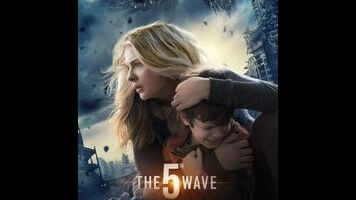The 5th Wave is just another post-apocalyptic killer-teen soap opera

What this ongoing YA adaptation cycle of dystopian and post-apocalyptic killer-teen movies really needs is a Starship Troopers: a film that could put the lie to the genre by exaggerating it into pitch-black, poker-faced satire. What it gets instead is The 5th Wave, a kids-trained-to-kill sci-fi flick that turns mildly subversive right before taking a headlong dive into sub-Twilight soap, complete with a conflicted super-human dreamboat. Based on a bestseller by Rick Yancey—the first in a planned trilogy, of course—The 5th Wave at least deserves kudos for finding the least enticing future setting possible: central Ohio, some time after the Earth has been attacked by aliens who don’t look like anything, and don’t even have cool spaceships. These are the end times of the survivalist imagination, where the last good people wear flannel and tote jugs of potable water with rifles over their shoulders, avoiding strangers and military round-ups.
Chloë Grace Moretz stars as Cassie Sullivan; once an ordinary teen who would spend her time having totally natural conversations about Sony smartphones and properties (Spider-Man count: two), she is now on her own, hiding outside Cincinnati from the surveillance drones of an alien invasion force. These aliens (dubbed “the Others”) have avoided those big “humanity’s last stand” land and air battles that alien invaders always suck at, instead opting to severely reduce the planet’s population by knocking out electronics and communications, creating artificial tsunamis, and giving everyone the flu, among other things. This is one of the more efficient and thought-out alien invasions in film, and one of the cheapest to visualize, which is a boon, because The 5th Wave seems to have had a severely limited effects budget.
What appears to be left of the American military is holed up at Wright-Patterson Air Force Base, training kids and teens—including Cassie’s younger brother Sammy (Zackary Arthur) and her school crush Ben (Nick Robinson), now known, respectively, as “Nugget” and “Zombie”—in advance of the presumably action-packed final step of the Others’ invasion plan. Even by the standards of the genre, The 5th Wave initially seems grimly fatalistic; before the viewer learns Cassie’s name, they’ve seen her accidentally kill a man while raiding a gas station for tampons. But like everything mildly interesting about The 5th Wave, that whiff of edginess is canceled out by the arrival of a teen-romance hunk, hilariously out-of-place in the movie’s hardscrabble Midwestern no man’s land.
Aside from a taste for Visual Storytelling 101 basics (a close-up of a dropped teddy bear, held for what seems like half a minute), British director J Blakeson (The Disappearance Of Alice Creed) doesn’t do much to distinguish himself from any number of hired guns. This is the TV-pretty version of the end of the world, with heroes who might not have access to medical supplies, but seem to possess stockpiles of hair product and makeup. One can’t help but think of the scene in Clouds Of Sils Maria, where the Kristen Stewart and Juliette Binoche characters go to see a soapy teen sci-fi movie, starring Moretz’s troubled teen star. As parody, Sils Maria’s film-within-the-film is totally unconvincing, but any clip from The 5th Wave would have seemed spot-on.
Moretz, who’s made her name playing everything but ordinary teens, is miscast as a normal high schooler in extreme circumstances; perhaps Maika Monroe—Goth-ed up here in a second-tier role as the requisite badass—might have done better. (However, Moretz’ manic emoting blesses The 5th Wave with the single goofiest slow-motion reaction shot in recent memory, so that’s something.) But credit should be given where it’s due: Before its characters start yawping lines like “I’m human and I’m Other! I’m both!” and having implied sex in abandoned station wagons—which, come to think of it, is a touching image of middle-class teens holding on to the last vestiges of suburban civilization—The 5th Wave manages to work its way to an easy-to-guess anti-authoritarian twist that fits the movie’s survivalist logic to a T, but sets up a much better film than what follows. But isn’t that the whole model of the dystopian teen franchise business? Promise them one ending, and they’ll pay for three books and four films.